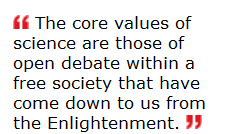|
|
|
|
|
|
|
News & Views item - October 2008 |
![]() That Charter of Rights and Obligations for Public Agencies -- The State of Play.
(October 30, 2008)
That Charter of Rights and Obligations for Public Agencies -- The State of Play.
(October 30, 2008)
First a bit of background to be followed by an excerpt from Senate estimates worthy of a libretto for a Rossini opera.
In an article in the January 16, 2008
Australian entitled "Liberating the voices of science", Senator Kim Carr,
Minister for Innovation, Industry, Science and Research, sets out how he intends to develop the "charters" under
which institutes and their personnel will be expected to publicly perform. He
opens with: "Australians look to our scientists and researchers to contribute to
our economic, social and environmental wellbeing and to expand our horizons of
knowledge. This inevitably involves controversial interpretations. It is through
the contest of ideas that we expand our understanding."
Science and Research, sets out how he intends to develop the "charters" under
which institutes and their personnel will be expected to publicly perform. He
opens with: "Australians look to our scientists and researchers to contribute to
our economic, social and environmental wellbeing and to expand our horizons of
knowledge. This inevitably involves controversial interpretations. It is through
the contest of ideas that we expand our understanding."
The most significant aspects are excerpted below and it is noteworthy that the minister is careful not to make unequivocal commitments of consequence to the researchers.
The Rudd Government looks to its science and research agencies to provide cutting-edge scientific research from which policy can be formulated. The Government recognises that it carries the responsibility for such policy formulation and is accountable to parliament and the people.
Public debate must be as well informed as possible and those who have expertise in the areas under debate must be able to contribute. This means that researchers working in our universities and public research agencies must be - and must be allowed to be - active participants in such debates.
It is not good enough to allow scientists and other researchers to comment on matters of public interest but then to quarantine them from contentious issues. As is often the case, it is in matters of contention and sharp debate that their knowledge and expertise is most valuable. Their right to speak out and to represent their research or discoveries must be protected.
Our public research agencies, by and large, lack any formal recognition of the rights of their research staff to legitimate freedom of expression.
The Rudd Government is committed to creating a charter (akin to that of the ABC)... [which]will identify and guarantee the responsibilities and obligations of each organisation. They will enshrine not only the right, but the obligation, of scientists and other researchers to participate in public research debates.
I will be consulting with public research agencies on developing a policy addressing these issues [to include]:
Encouragement of debate on scientific and other research issues of public interest.
Support for the independence and integrity of public research agencies.
Recognition that the Government remains responsible for the articulation, formulation and implementation of government policy.
Support for the open communication, dissemination of information and debate about the results of scientific, technical and social research.
Recognition that researchers are encouraged to engage in such communication and debate.
Now something over 9-months have passed and it remains for Senator Carr to lay out the specifics of the "charter(s)" so that researchers and public alike will be able to judge if the Rudd Government will tolerate trenchant criticism let alone pay it heed or even be influenced by it.
________________________________
The scene: Thursday, October 23, 2008 -- Transcript from Senate Estimates, the Senate Standing Committee on Economics.

|
 |
|
Senator Kim Carr |
Senator Eric Abetz |
Cast:
Chair: Labor Senator (South Australia) Annette Hurley
Liberal Senator (Tasmania) Eric Abetz: deputy leader of the opposition in the Senate
Labor Senator (Victoria) Kim Carr: Minister for Innovation, Industry, Science and Research
Secretary Department of Innovation, Industry, Science and Research: Mr Mark Paterson AO
Head of Science and Research Division: Ms Jessie Borthwick
_______________________________________
Committee members' names are in upper case
Senator ABETZ— Can I turn to a charter of academic
rights and responsibilities?
Mr Paterson—Yes.
Senator ABETZ—What is the current status of the
academic charter of rights and responsibilities?
Senator Carr—Are you talking about the agencies’
charters?
Senator ABETZ—The one you announced on 16 January.
Senator Carr—The charter is related to the agencies.
Senator ABETZ—Was that being driven out of your
office? Has any departmental assistance been given? Yes?
Senator Carr—There was department assistance but—
Senator ABETZ—Thank you. So from the departmental
point of view, can I ask how is it progressing?
Senator Carr—What is the question?
Senator ABETZ—Sorry?
Senator Carr—Our problem is trying to identify what is
your question.
Senator ABETZ—What is the current status of this
charter, or these charters, in relation to the various agencies? Is it going to
be in the form of one charter applying to everybody or will there be specific
charters for specific bodies? Let us drill right down then.
Senator Carr—These charters vary from agency to
agency. There are common elements in so far as all of the agencies are
concerned, but then there are specific elements for each of the agencies. They
are in the process of negotiation.
Senator ABETZ—How is it progressing? We have got
negotiations underway and I understand the department is part and parcel of
undertaking that negotiation with each agency. Is that correct?
Senator Carr—Last time I had a look at this they were
pretty close to completion.
Senator ABETZ—Good. So in that case the answer is,
‘The negotiations have gone very well’, which is good. If they are very close to
completion, when do we think that we might announce them and will they be
announced as a job lot or will it be announced agency by agency?
Senator Carr—I will be taking advice on that.
Senator ABETZ—Undoubtedly from your department?
Senator Carr—I have not made a decision on that yet.
Senator ABETZ—Have some agencies’ charters progressed
quicker than others in negotiation?
Senator Carr—They are all pretty much the same.
Senator ABETZ—We were told that there were standard
elements in each but that they were also specifically tailored for each agency.
Is that correct?
Ms Borthwick—Yes.
Senator ABETZ—So, I am wondering in relation to the
dealing of the specifics for each particular agency, have they all gone
swimmingly or have some agencies taken a bit longer than others?
Senator Carr—No.
Senator ABETZ—So, they have all been able to respond
at exactly the same time?
Senator Carr—All the advice coming to me is that they
have gone very smoothly and they are being discussed within each of the agencies
in their decision-making processes.
Senator ABETZ—They are all going very smoothly. Are
some going more smoothly than others?
Senator Carr—There is no problem with any of them.
Ms Borthwick—All of the charters are close to
finalisation and they have progressed to the point where they are all now close
to conclusion.
Senator Carr—I do not know what the difficulty is. It
would stand to reason that when you are dealing with a number that some might be
closer to completion than others. That is all.
Ms Borthwick—That is what I am saying. They are all at
the same point now. That is what I understand.
Senator ABETZ—Exactly the same point?
Ms Borthwick—Correct. My understanding is we are close
to concluding all of them now.
Senator ABETZ—So, no more negotiations are required?
Senator Carr—I am not aware of any difficulties in
terms of negotiations. As far as I know it is a question of—
Senator ABETZ—But are any more—
Senator Carr—I will try to answer your question. As
far as I am aware it is a question of board schedules and sign-offs within each
of the agencies, but no-one has drawn to my attention any difficulties with any
of the agencies.
Senator ABETZ—Just because it has not been drawn to
your attention does not necessarily mean that there have not been certain
difficulties because your departmental officials undoubtedly can handle these
things very well without bothering you with the detail. So, all I am seeking to
do—
Senator Carr—If there were difficulties I would expect
to hear about them, and I have not.
Senator ABETZ—I am willing to accept that they have
all run very smoothly, but it stands to reason that some would have run smoother
than others. It would be a strange world if every single agency responded in
exactly the same way in relation to every aspect. It just would not be the real
world. So I do not think my questioning is out of order in any way and I think
it is relevant. We are entitled to know whether there have been any
difficulties.
Ms Borthwick—I support what Minister Carr has said in
that some of the progress has been subject to the timetables of various board
meetings, but none of them have come across obstacles which we could not
negotiate or resolve, and they are all at the same point now, which is close to
conclusion.
Senator ABETZ—That is fine, but it stands to reason
that those issues that you had to negotiate to resolve, with some agencies it
was easier or quicker to resolve than with other agencies. That is all I am
asking, and I would have thought in the real world the very simply answer would
be yes, each agency is different and, yes, some agencies were quicker and easier
to negotiate with than other agencies. What is the difficulty with telling the
Senate that?
CHAIR—I think there is some confusion. If there is a
particular point or if you know of some agency, it might be helpful if you would
expand on it.
Senator ABETZ—The art of asking questions you can
leave to me, thank you.
CHAIR—I am just trying to be helpful because there
seems to be some confusion
Senator Carr—We are going around in circles here.
Senator ABETZ—Only because I am not being given a
direct answer.
Mr Paterson—You have got a direct answer from Jessie
Borthwick. She has given you a quite explicit, direct answer. There have been no
problems. There have been negotiations. They have been resolved amicably and all
of the negotiations are at the same state. I am not sure that we can give any
straighter answer than that.
Senator ABETZ—As we are getting to the stage where we
are at now with all of them, you cannot tell us whether the progress to the
stage where they are all at now was smoother with one agency as opposed to
another agency? That is all I am seeking to inquire about.
Mr Paterson—I think we have indicated on a number of
occasions—
Senator ABETZ—That they were all exactly the
same—please!
Mr Paterson—Not exactly the same—
Senator ABETZ—Thank you.
Mr Paterson—But with respect, you are asking whether
there were impediments or if there were problems or if there have been
challenges in relation to these negotiations and the officer has given advice
that the negotiations have proceeded smoothly and they have all reached a
conclusion. I do not know what else we can give you.
Senator ABETZ—We are entitled to know how the progress
went in relation to each one. I accept that they are now all at the same stage.
I have no reason to doubt that in any way, shape or form. I am asking about the
progress to the point we are at now as to wether negotiations and discussions,
timeliness of responses et cetera was better with one agency as opposed to
another agency. That is all I am asking. In the real world it would stand to
reason that some agencies were more expeditious or more cooperative than others.
But you are saying they were all exactly the same. They were all like identical
twins; you could not tell them apart.
Mr Paterson—No, we are not suggesting that to you and
we have not suggested that to you. We have indicated—
Senator ABETZ—All right then, tell me the differences.
Mr Paterson—What we have indicated to you is that
there were no impediments along the way.
Senator ABETZ—But that is not the question I am
asking. I am not asking about impediments, I am asking about the differences.
Mr Paterson—What differences would you like us to
examine?
Senator ABETZ—I do not know whether there were any
differences—
Mr Paterson—I have tried to indicate—
Senator ABETZ—If you could acknowledge that in the
real world there would have been differences in relation to timeliness of
responses or the negotiations that had to happen in relation to each agency
because I understand each agency, whilst on a standard basis, is treated
differently, it stands to reason that there would be a difference in the time
line that got us to where we are at now where they are all equal.
Senator Carr—There is no difficulty with these
negotiations. Each of the agencies was responsive. Each of the agencies has
considered these matters very carefully. We are simply waiting on a final
sign-off. I am not aware of anybody indicating any serious difficulties in terms
of the processes for the resolution of these questions.
CHAIR—Senator Abetz, if
you do not mind, Senator Boswell has been waiting for some time to ask a
question. I am happy to let you return.
 |
|
From Nature's Editorial 081030 |
Senator ABETZ—I would not mind just closing this off.
Mr Paterson and officials and, in particular, Minister, I really cannot
understand the difficulty in answering the question. I know where we are at
today. I accept that at face value they are all basically ready to be signed
off. I think that is the stage we are at. Can I compliment you on achieving and
arriving at that? But the journey to getting there clearly must have been
different for each agency. For that not to be acknowledged is quite frankly mind
numbing and I think not fair to this Senate committee.
Mr Paterson—I take exception to suggestions that we
are not being fair to this committee. We are answering your question as openly
and as honestly as we can. There have been no problems. We are not going to sit
here and single out an agency just for the sake of identifying a problem that
did not exist. We say there were no problems in relation to the negotiations.
There are no problems. What can we identify for you that we have not identified
for you if we do not have a problem?
Senator ABETZ—I am asking: was one agency quicker to
respond than another in relation to this charter of rights and responsibilities?
Surely some responded quicker than others. Are we willing to concede that?
Ms Borthwick—With regard to the
process, the overall speed is from the beginning of the process to now. Some of
those, as I indicated earlier, were subject to different timing because of
consideration by board meeting dates. That contributed to some of the timing
issues.
Senator ABETZ—That would be a timing issue—
Senator Carr—We have canvassed this. This point was
made 20 minutes ago.
Senator ABETZ—After your discussion—
CHAIR—Senator Abetz, Senator Boswell really has been waiting for some time. It is a query about whether he can ask a question. It will just take a couple of minutes.
_____________________________________